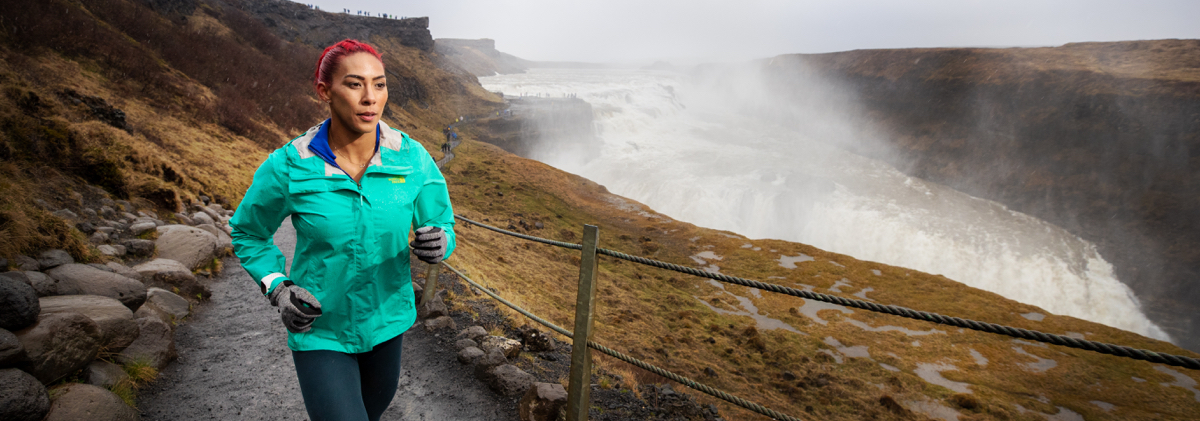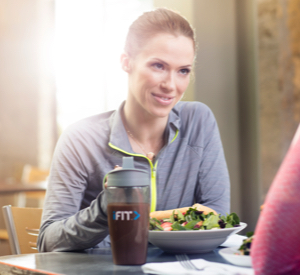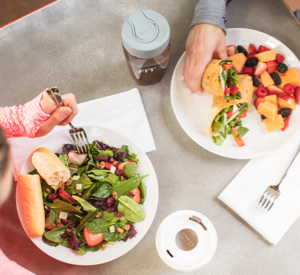
The expression, “You are what you eat” rings particularly true for runners. The foods that you use to nourish your body as a runner can have a dramatic impact on your body’s performance and your ability to reach your goals. So, let’s explore the power of diet for runners and how it can affect your mindset, health, performance, as well as giving you ways that you can make certain changes to improve all of the above.
Ways To Improve Your Mindset About Your Diet
The first step to improving your diet is to be mindful of the foods you eat. Seeing your food as the fuel your body needs to reach your goals can help you improve your selections. Here are some tips to help you improve your mindset towards your diet:
Set Goals And Track Your Progress Along The Way
To help you achieve lasting dietary changes, set small goals and track how well you do with each adjustment. Acknowledging your small victories can be the motivation you need to stick with it!
For example, smaller goals might be to drink more water, increase the number of vegetables in your diet, or reduce the amount of sugar you consume per week. The following week, you may want to up your water intake by half a cup, add in more or new vegetables to your meals, and cut out more sugar in each meal. Small goals!
Choose A Goal That Will Challenge You
To help you make some progress, make an effort to challenge yourself with something new. Challenging yourself to change your eating habits and your environment can help you eat healthier foods.
Implement Changes For Improvement
As you make changes to your diet and training regiment, focus on making continuous improvements rather than focusing on the areas you fell short in. Ask yourself, “Am I continuously improving in the direction where I want to go?” Then be sure to follow through with your actions.
Welcome Feedback From Others
When you focus on improving other aspects of your training, you likely seek advice and feedback from your trainers and others involved in your running. Similarly, when it comes to a runner’s nutrition and diet, getting advice from nutritionists and trainers can help you make the best decisions for you and your body. What you may see may be different than what others see––giving yourself another vantage point of what needs some improvement can be just the ticket to achieving results for yourself.
Don’t Try To Be Perfect
In general, you may want to aim to eat only nutritious whole foods, but don’t kick yourself for caving in to eating your favorite ‘junk’ foods every now and then. We all have our moments of diving face-first into sugary bliss, so once you come to the realization that you’re human and may slip with your diet, it doesn’t mean you’ve wrecked all your progress. Let that minor slip fuel your motivation towards not giving into temptation next time because the reward may taste better than that momentary taste of sweetness.
Note How Your Dietary Changes Impact You
As you make adjustments to your diet, take notice of how you feel emotionally and physically, especially when you’re running. Keep in mind, each person has their own epigenetic expression, their own enzyme makeup, as well as their own microbiome design. While certain foods may cause discomfort for one person, another may not experience discomfort at all. So, noting changes in your diet, both positive and negative, can help you find the diet that fits you best.
Healthy Diet For Runners
You may be wondering, “What does a runner eat in a day?” While it may look different ranging from runner to runner, it may typically include a variety of different whole foods that nourish their bodies and prepare them to run well.
Since meal plans for runners generally are not universal, everyone has to determine the precise diet that works best for their particular body. iFit® trainer, Emily Paskins, explains that nutrition is a complicated puzzle for runners.
“Nutrition is such a complicated part of training––because each body is unique. One standard does not work for everyone. However, there are some common nutritional guidelines that will help you come closer to your goals.”
Let’s take a look at some of Emily’s diet tips below, as well as some guidelines to keep in mind as you make your nutritional decisions:
Choose Whole Foods
As Emily states in regards to eating before a race, “ Eat real food. Preceding the event, try to cut back on fast foods, frozen dinners, or canned food.”
Choose Quality Carbs
Reach for carbs that have not been overly processed. Before your next running event, Emily explains the right way to eat carbs: “Carb loading is NOT just about eating out at an all-you-can-eat pasta dish restaurant the night before your event. This can leave you feeling lethargic if you are not used to the high carbohydrate intake, and a splurge can make you overly full. Carb loading should actually begin three days prior to the race to help your body store adequate fuel for the event. […] Try to eat a variety of vegetables, fruits, and whole wheat grains.”
Listen To Your Body
Always pay attention to how your body reacts and functions with what you’re eating and drinking.
Stay Hydrated
It’s important to stay hydrated at all times, especially before, during, and after your running event.
Runner’s Diet Hacks
A big part of making good decisions regarding your diet and the foods you eat comes down to the decisions you make in the grocery store.
Stocking your home up with plenty of nutrient-dense foods that help to fuel your training can help you make good decisions in the moment and improve your performance without the temptation of unnecessary foods waiting for you in your fridge.
The first rule of shopping like a runner lies in focusing on, once again, whole foods. We cannot promote whole foods enough. Processed foods, particularly before races, can derail progress and results.
If you are making adjustments to your diet, you want to do any experimenting during your training periods that are far from any planned races. This will give you time to adjust to any changes and ensure that nothing upsets your stomach and avoid dismantling your race performance.
Foods Runners Should Avoid
As you begin to take steps to improve your diet to boost your running performance, you should note that there are some foods that can wreak havoc on runners’ bodies and should be avoided before a run. Here are a few foods that we recommend runners avoid as they work to improve their diets.
Avoid Sugary Foods
Foods like cookies, candy, and sugary cereals can all cause your blood sugar to spike––further leading to irritability, cravings for more sugary foods, as well as storing fat.
Avoid Fried Foods
Some types of foods, such as fried foods, can be hard for the body to digest, which can lead to gastrointestinal distress.
Avoid Pre-Packaged/Frozen Foods
Although pre-packaged foods and frozen dinners offer undeniable convenience, most do not offer your body the nutrition it needs. Many of these foods contain excessive amounts of fat and salt, which should be limited in a diet for runners.
Avoid Sodas
Sodas are loaded with sugar. In fact, one typical soda contains 7 to 10 teaspoons of sugar. Large amounts can harm kidney function and even impair your metabolism.
Avoid (Some) Nuts
Not all nuts are created equal. Certain types of nuts contain more calories than others and should be eaten within moderation. Nuts that are roasted in oil and sugars tend to contain more calories and preservatives than those that aren’t. Ground, raw, or dry-roasted nut butters are your best options.
As you can see above, a runner’s diet plays a crucial part in their overall training and performance. Considering what it takes to make a successful diet for runners, a great mindset with food, the ability to make healthy choices, and overall strong dedication takes you further on the path towards improved runner performance and better health.
DISCLAIMER: This post is not intended to replace the advice of a medical professional. The above information should not be used to diagnose, treat, or prevent any disease or medical condition. Please consult your doctor before making any changes to your diet, sleep methods, daily activity, or fitness routine. NordicTrack assumes no responsibility for any personal injury or damage sustained by any recommendations, opinions, or advice given in this article. Always follow the safety precautions included in the owner’s manual of your fitness equipment.
Sources:
https://healthcare.utah.edu/healthfeed/postings/2017/03/marathon-nutrition.php
https://www.health.harvard.edu/blog/nutritional-psychiatry-your-brain-on-food-201511168626
https://health.clevelandclinic.org/mindful-eating-lose-weight-like-a-yogi/
https://www.nordictrack.com/learn/ceo-fit-bottomed-world-shares-goal-setting-tips/
https://wa.kaiserpermanente.org/kbase/topic.jhtml?docId=ad1169
https://www.nordictrack.com/learn/ifit-community-support-while-social-distancing/
https://www.nordictrack.com/learn/whole30-diet-beginners-guide/
https://www.nordictrack.com/learn/workouts-offered-on-ifit/
https://www.ifit.com/blog/runners-nutrition
https://runningmagazine.ca/health-nutrition/nutrition-get-real-whole-foods-for-runners/
https://runningmagazine.ca/health-nutrition/tips-for-avoiding-bloating-and-gas-while-running/
https://www.webmd.com/diabetes/causes-blood-sugar-spikes
http://www.harrisonnutrition.com/blood-sugar-rollercoaster/
https://www.webmd.com/digestive-disorders/ss/slideshow-foods-to-avoid
https://www.runnersworld.com/nutrition-weight-loss/a20802948/foods-runners-should-avoid/
https://www.runnersworld.com/nutrition-weight-loss/a25737178/is-sodium-bad-for-you/
https://www.hsph.harvard.edu/nutritionsource/healthy-drinks/sugary-drinks/
https://www.livestrong.com/article/517219-the-effects-of-carbonated-drinks-on-exercising/




